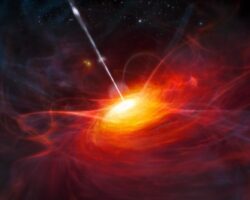Quasar “clocks” show that in the first billion years after the Big Bang, time seemed to move five times slower.

Quasars in the early universe have been observed to pass time more slowly.
The combination of the expansion of space and Albert Einstein’s theory of general relativity results in the observed dilation of time. “A cosmologist at the University of Sydney named Geraint Lewis told Space.com that this is yet another “Einstein is right again” story at its core.
A new paper co-authored by Lewis and Brendon Brewer of the University of Auckland provides the long-awaited confirmation of time dilation effects in quasar variability. An accreting supermassive black hole at the center of an extremely active galaxy powers a quasar. Variations in the quasar’s light emission can occur within days due to the relatively small accretion disk around the black hole. This makes it simpler to follow them.
Notwithstanding, in the time since the light, and its changes, was transmitted from the 12 billion-year-old quasars, the universe has extended extraordinarily. This indicates that the quasars are as they were 12 billion years ago when we observe them.
Lewis stated, “We expected quasars to also exhibit this behavior, but previous searches had not found it.”
Lewis and Brewer now have the tools necessary to finally detect time dilation in the variability of quasar light thanks to a new sample of 190 high-redshift quasars that were observed over a 20-year period by the Sloan Digital Sky Survey (SDSS), Pan-STARRS, and the Dark Energy Survey. The extensive stretch of perceptions combined with adaptive aversion to the quasar variances uncovers the time enlargement impact. Time in these quasars appears to be five times slower than it is for us in our frame of reference on Earth based on how slowly the fluctuations appear to be occurring.
Lewis stated, “We can pinpoint the characteristics of their variability and demonstrate that quasars truly cooperate with the cosmos.”
To be clear, time did not actually move slowly in those quasars in comparison to everything else around them; rather, time moved normally within their frame of reference. The idea of frames of reference and the fact that these frames can be distinguished by their velocity in relation to one another is the foundation of Einstein’s theory of relativity as well as how he described the passage of time.
Lewis stated, “The motion of distant galaxies is due to expanding space.” Take into consideration that the Hubble constant describes the rate of expansion of a volume of space that is 3.26 million light-years across per second. The expanding volumes of space add up in this incremental effect. There is more space between a galaxy and us the further away it is, and the faster it appears to be moving away from us.
“A portion of these quasars were moving quicker than the speed of light, comparative with us, when the photons were produced,” said Lewis.
When you get close to the speed of light, strange things happen, as Einstein demonstrated. One of these weird things is time widening. A clock traveling faster than them, whether on a spacecraft or in a quasar, would appear to slow down for a stationary Earth observer. The quicker the clock is moving, the more prominent the impact. The twin paradox and other peculiarities are the result of the effect’s dramatic amplitude at speeds close to light speed.
Time dilation is more than just a theory. The Global Positioning System must take into account the fact that satellites orbiting the Earth have detected it, albeit in trace amounts. Time dilation has been observed from a cosmological perspective in supernovae that exploded between 6 and 7 billion years ago, but it has never been observed in objects further away until now.
The time dilation observed in quasars is further evidence that we do indeed reside in a universe that is expanding as a result of the Big Bang, as well as another successful test of Einstein’s theory of relativity. On the off chance that the universe were not growing, the quasars wouldn’t give off an impression of being moving at relativistic rates comparative with us. Lewis portrayed the discoveries as “taking care of a portion of the more outrageous thoughts that had been proposed, including that cosmologists miss the point entirely, because of the past inability to see quasar time expansion.”


